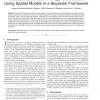Free Online Productivity Tools
i2Speak
i2Symbol
i2OCR
iTex2Img
iWeb2Print
iWeb2Shot
i2Type
iPdf2Split
iPdf2Merge
i2Bopomofo
i2Arabic
i2Style
i2Image
i2PDF
iLatex2Rtf
Sci2ools
145
click to vote
PAMI
2008
2008
Multilayered 3D LiDAR Image Construction Using Spatial Models in a Bayesian Framework
Standard 3D imaging systems process only a single return at each pixel from an assumed single opaque surface. However, there are situations when the laser return consists of multiple peaks due to the footprint of the beam impinging on a target with surfaces distributed in depth or with semitransparent surfaces. If all these returns are processed, a more informative multilayered 3D image is created. We propose a unified theory of pixel processing for Lidar data using a Bayesian approach that incorporates spatial constraints through a Markov Random Field with a Potts prior model. This allows us to model uncertainty about the underlying spatial process. To palliate some inherent deficiencies of this prior model, we also introduce two proposal distributions, one based on spatial mode jumping and the other on a spatial birth/death process. The different parameters of the several returns are estimated using reversible-jump Markov chain Monte Carlo (RJMCMC) techniques in combination with an a...
Related Content
| Added | 28 Dec 2010 |
| Updated | 28 Dec 2010 |
| Type | Journal |
| Year | 2008 |
| Where | PAMI |
| Authors | Sergio Hernandez-Marin, Andrew M. Wallace, Gavin J. Gibson |
Comments (0)

